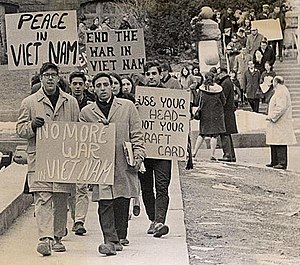
“There is…a nonchalance attitude on campus,” said Stephen Mumme, a political science professor at CSU.
Mumme suggests that students are not engaged or interested in the politics of their nation, and have not been for the past decade’s worth of foreign conflicts. With the recent happenings in Syria, this has become all the more apparent.
“Students are either not informed enough or not interested enough,” said Marlee Sackschewsky, president of the CSU College Democrats.
The issue of political inactivity is relatively new for the university. In the past, students have put out more of a voice in the community.
During the times of the Vietnam Wars, for instance, there were countless numbers of actively protesting students. Political Science Professor John Straayer wrote an email to the Collegian describing his personal experience.
“There was a generous and interesting meld of anti-war music, pot, long hair, tie-dye apparel and passionate calls to ‘tear down the system,’” Straayer wrote.
Straayer further explained that students of the time would occupy university buildings, boycott class, and often conduct “teach-ins” that involved extensive speeches about war, immorality, and disagreements with military policy.
However, by the times of the Iraq and Afghanistan invasions, most students had entirely lost their gusto.
“I didn’t see a lot of campus agitation,” Mumme said.
“We saw little by way of organized protest,” Straayer wrote.
So why the change? The professors agreed that is is entirely due to the lack of a military draft.
During the Vietnam Wars, men were involuntarily drafted into fighting for the decisions of their nation. Nowadays, students have nothing to worry about, and it shows.
“We now have an all-volunteer military. Neither students nor non-students get all worked up and passionate about matters that do not impact them directly,” Straayer wrote.
Sackschewsky cited social media as another possible reason.
“There are too many distractions nowadays, like Facebook and Twitter,” she said.
No matter the explanation, the professors agree that there is a general apathy on campus. Mumme even suggests it is more of an isolation than a disinterest.
“(Students) think of themselves as a special category and not as part of their community,” Mumme said. “They should think of themselves as citizens first, and students second.”
Mumme also says that student organizations and government should not be the only thing students concern themselves with.
“Student government shouldn’t be a substitute for civic responsibility,” Mumme said. “Once (students) reach voting age, they are citizens and they have the responsibility to act…with civic interest.”
Is is because of this responsibility that Mumme encourages every student to try and make a difference in their community.
“Students can be more influential than they think,” Mumme said. “And that’s my point of view from the Vietnam War.”
Collegian City Beat Reporter Caitlin Curley can be reached at news@collegian.com.





